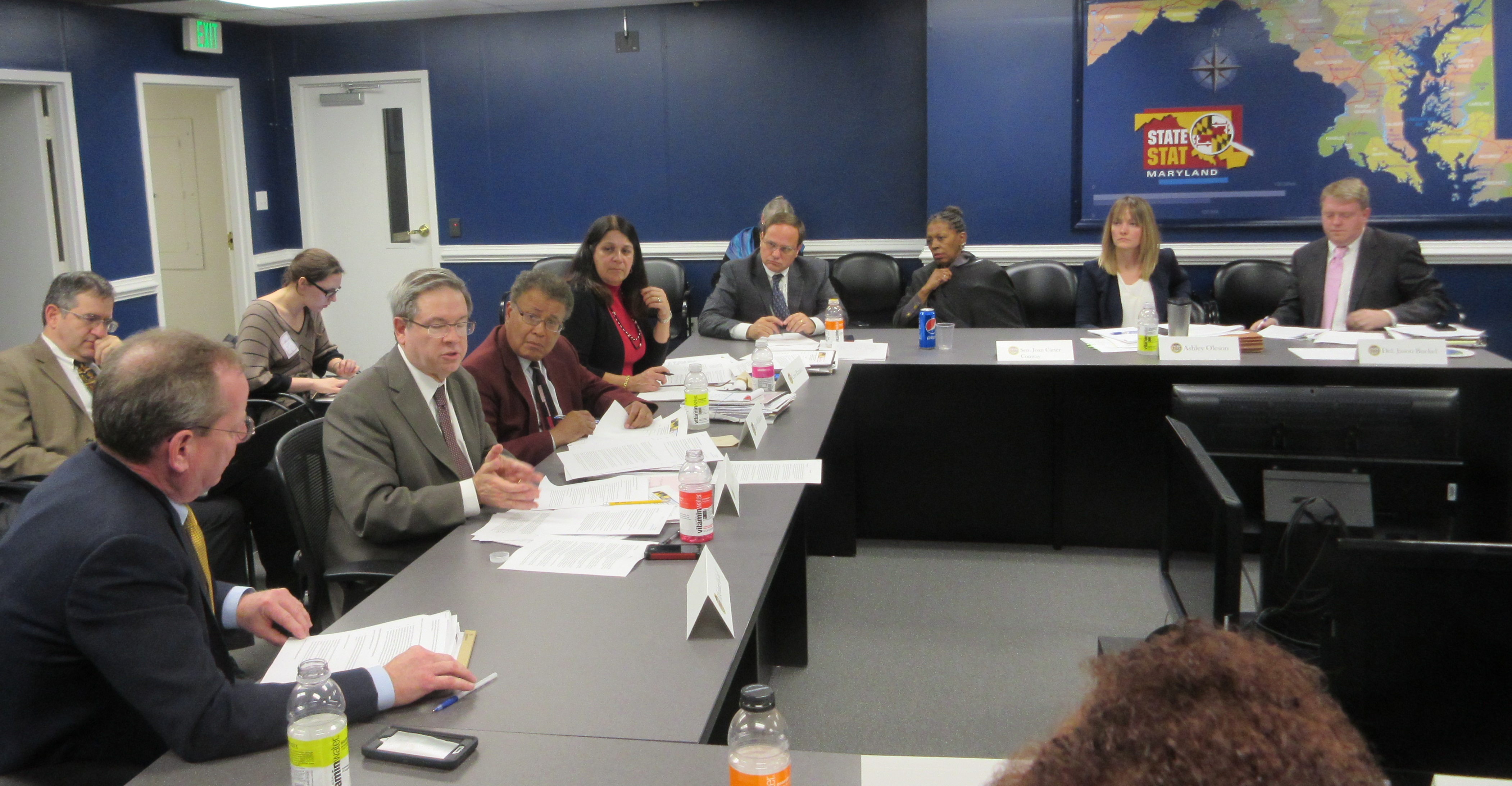By Naomi Eide
Capital News Service
The Maryland Redistricting Reform Commission met Tuesday to craft recommendations for ways to fix gerrymandering in Maryland, focusing on establishing an independent group to redistrict both congressional and legislative districts.

Members of Gov. Hogan’s redistricting reform commission discuss the shape of a new independent process.
The commission hashed out intricate rules to limit partisan influence and ensure the independence of the new panel. The commission will recommend that any new independent commission apply current state standards for legislative districts to congressional redistricting.
When drawing congressional boundaries in the current system, Maryland’s governor leads the process, which follows a more general federal standard. These rules mandate that districts must be drawn with equal populations and in compliance with the Voting Rights Act, which prohibits racial discrimination in the voting process.
Contiguous, compact, follow natural boundaries
But when drawing state legislative boundaries, under Maryland law, districts must be contiguous and compact, “with due regard for natural boundaries and the boundaries of political subdivisions”.
In the past, minority lawmakers and political groups have complained that minority populations are split up and grouped together to help keep incumbent Democrats in power.
The commission held five public regional meetings in different parts of Maryland, hearing from legislators and residents about their ideas on how to reform voting districts.
Hogan in August signed an executive order creating the commission to address gerrymandering in both legislative and congressional voting districts. The governor wanted the commission to formulate a new independent, bipartisan commission.
Shape of the proposed commission
The commission is recommending a new, nine-member group, made up of three Democrats, three Republicans and three independents.
The commission is recommending that a panel of three judges — one judge from the Court of Special Appeals of Maryland and two from the Maryland Circuit Courts — be chosen at random to select the members of the group.
To apply to serve as member of this independent group, applicants must have been a Maryland resident for the past five years, they cannot have switched party lines in the past five years and they cannot have run for legislative or congressional office in the past five years.
The judges will choose 30 people — 10 Democrats, 10 Republicans and 10 independents from the pool of applicants — to possibly serve on the work group.
From those 30, nine individuals will be randomly chosen, with three from each political affiliation, to become members of the independent redistricting panel.
Independence illusory
Sen. Joan Carter Conway, a member of the redistricting commission, said that focusing on creating an independent group to redistrict Maryland is not possible since everyone involved has some political connection, such as the governor’s role of appointing judges and the legislature’s role in confirming them.
Members of an “independent redistricting commission are as far from independent as the legislators are,” said Conway, D-Baltimore City.
Judge Alexander Williams, co-chair of the commission, had favored giving legislative leaders of both parties a say in appointing four members of any new commission, but other members of 11-member of the redistricting reform commission rejected the idea.
As she did last week, Conway emphasized that the commission should do something to fix congressional districts but avoid the legislative districts.
Redistricting occurs every 10 years following the results of the U.S. census. In 2012, Gov. Martin O’Malley, D, redrew the 6th congressional district, taking away conservative voters in order to oust a veteran Republican congressman.
Seven of the state’s eight seats in the U.S. House of Representatives are now held by Democrats.
The commission must submit a report to the governor, Senate President Mike Miller and House Speaker Michael Busch by next Tuesday, when the members will take a final vote on their work.



I have written a lengthy post on this topic, that might add something to the discussion. You can find it at http://fampu.com/2015/11/17/redistricting-for-congress/.
I’m finally getting 111 Dollars an h r,….It’s time to take some action and you can join it too.It is simple,dedicated and easy way to get rich.Three weeks from now you will wish you have started today….
===>>> Link in my pr0f1Ie
136
In the unlikely event that this proposal got off the ground, I have some questions about the mechanics. Exactly who would be randomly selecting the all-important three judges and how would this random selection occur? Is it the 30-member work group that would be randomly selecting the nine members of the independent redistricting panel from their midst? Exactly how would they randomly select the all-powerful nine? Would the product of the redistricting panel go into effect automatically or would it have to go through the legislative process in some way?
A daring proposal that is sure to get a lot of attention both locally and nationally. It will be most interesting to see what happens when the legislature pulls out its long knives.